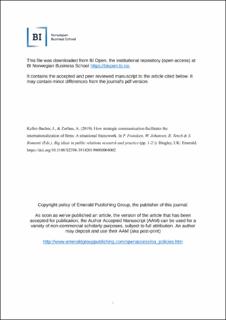| dc.contributor.author | Keller-Bacher, Jule | |
| dc.contributor.author | Zerfass, Ansgar | |
| dc.date.accessioned | 2022-01-31T19:32:39Z | |
| dc.date.available | 2022-01-31T19:32:39Z | |
| dc.date.created | 2020-01-09T22:46:40Z | |
| dc.date.issued | 2019 | |
| dc.identifier.citation | In F. Frandsen, W. Johansen, R. Tench & S. Romenti (Eds.), Big ideas in public relations research and practice | en_US |
| dc.identifier.isbn | 9781838675080 | |
| dc.identifier.uri | https://hdl.handle.net/11250/2976139 | |
| dc.description.abstract | This chapter examines the specific role of strategic communication as a facilitator for business internationalization. It provides a new and comprehensive rationale for explaining the contribution of strategic communication to the global success of companies and shows communication leaders how they could demonstrate the value of communication for internationalization.
The chapter identifies an important contribution of strategic communication in today’s globalized world, which demands further attention in academia and in practice by addressing three research questions: (1) How can strategic communication be conceptualized as part of the internationalization of firms? (2) Which specific objectives, responsibilities and practices can be assigned to strategic communication within the process of internationalization? (3) Does the theoretical framework capture the significant components of strategic communication within internationalization, appropriately from the point of view of senior experts in the field?
The chosen approach is conceptual and empirical. A cross-disciplinary literature analysis has been performed to construct a framework that links possible forms and manifestations of strategic communication to different situations of international business development. Qualitative interviews with senior communication executives were conducted to verify the plausibility of the theoretical framework from a professional point of view. The study identifies four core fields of strategic communication within the internationalization processes: initiation, transformation, expansion and integration. Communication should be implemented differently within the typical periods of internationalization, and communication management should focus on different aspects during these processes. Empirical findings indicate that the core fields depicted in the framework are either already applied in practice or perceived as plausible and doable.
From a theoretical standpoint, this study emphasizes the value of a cross-disciplinary perspective on corporate communications, which helps to bridge gaps between management research and communication studies. The study expands the body of knowledge in strategic communication by integrating new objectives and activities. | en_US |
| dc.language.iso | eng | en_US |
| dc.publisher | Emerald | en_US |
| dc.relation.ispartof | Big ideas in public relations research and practice | |
| dc.title | How strategic communication facilitates the internationalization of firms: A situational framework | en_US |
| dc.type | Chapter | en_US |
| dc.description.version | acceptedVersion | en_US |
| dc.source.pagenumber | 1-24 | en_US |
| dc.identifier.doi | 10.1108/S2398-391420190000004002 | |
| dc.identifier.cristin | 1769899 | |
| cristin.unitcode | 158,9,0,0 | |
| cristin.unitname | Institutt for kommunikasjon og kultur | |
| cristin.ispublished | true | |
| cristin.fulltext | postprint | |
| cristin.qualitycode | 1 | |
